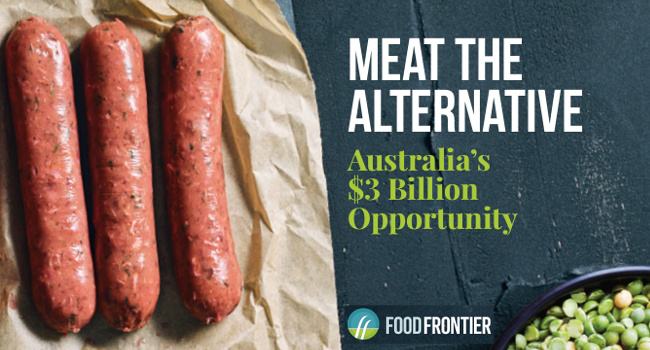
Article from Pro Bono Australia.
World-first economic modelling has found that the plant-based meat sector could boost Australia's economy by up to $3 billion and create more than 6,000 full-time jobs by 2030.
The report, Meat The Alternative: Australia's $3 Billion Opportunity, was commissioned by Food Frontier, Australia and New Zealand's think tank for alternative proteins, and conducted by Deloitte Access Economics.
It found plant-based meat is currently an emerging sector in Australia, generating approximately $150 million in domestic sales, almost $30 million in manufacturing and supporting 265 jobs.
But this stands to grow to between $398 million and almost $3 billion a year in economic value and between $1.4 billion and $4.6 billion in consumer expenditure by 2030, reflecting three scenarios.
Under the moderate scenario, on which Food Frontier has based its recommendations, the sector will generate $1.1 billion in economic value, almost $3 billion in consumer expenditure, and employ more than 6,000 full-time employees.
Food Frontier CEO Thomas King, who launched the report at international agrifood forum Global Table on Wednesday, said the research demonstrated overwhelmingly strong growth prospects for Australia's plant-based meat sector over the next decade.
"It's crystal-clear that Australia has a massive opportunity on its doorstep, which this report aims to quantify," King said.
"Put simply, we're facing a multi-billion-dollar opportunity for Australia to become a global plant-protein powerhouse, and the great news is we already have the intellectual and infrastructure assets to seize it."
The report marks the first analysis of its kind globally that quantifies the current and potential size of a plant-based meat sector and its impact on a national economy.
King told Pro Bono News it was clear the plant-based sector was on the cusp of significant expansion.
"It comes off the back of a wave of new plant-based meat products, enabled by advances in food science and culinary creativity, that aim to mimic the sensory experience of eating conventional meat with fewer environmental and health impacts," he said.
He said was important to recognise the opportunity for the food manufacturing sector and for hard working Australian farmers to grow crops for the plant-based meat supply chain and secure market share from imported products.
At a state level, Victoria stands to gain 31 per cent of predicted manufacturing and jobs, with New South Wales coming a close second with 29 per cent. Queensland will gain 22 per cent of market share, while South Australia, Western Australia and Tasmania are set to gain 8 per cent, 7 per cent and 3 per cent respectively.
But King cautioned that Australia needed to act quickly to stake its claim in the global plant-based meat sector or risk being left behind by its competitors.
"Support from government and investment by business is urgently needed to drive nationwide job growth and the economic benefits projected over the next decade, ensuring a robust and competitive plant-based meat industry into the future," he said.
"From research and development into ingredients and high-protein crops, to capacity building across all stages of product manufacturing, a range of opportunities exist for investment, and grant and tax incentives, to help grow this new sector."
Analysis shows there are currently more than 100 plant-based meat products from 21 brands stocked in major Australian supermarkets.
Independent market research for Food Frontier by Colmar Brunton reveals one in three Australians have tried the new generation of plant-based meat products.
Additionally, one in three Australians (32 per cent) are limiting their consumption of conventional meat, driven by increasing awareness about the impacts of their food choices.
King said that recent, warnings and recommendations from the UN's International Panel on Climate Change, EAT-Lancet scientists, and the Australian Heart Foundation concerning the environmental and health impacts of meat could not be ignored as drivers of consumer interest in plant-based meat.
"More and more Aussies are discovering that plant-based meats mean enjoying their favourite meals, from sausages to meatballs, while having a lighter impact on their health and the planet," King said.
He said he hoped the government recognised the opportunity and the role that Australia could play.
"By boldly embracing this opportunity, we can fundamentally shape the food system for generations to come," he said.

Unsubscribe at any time. Your details are safe, refer to our privacy policy.
© Vegan Australia | Registered as a non-profit charity by the ACNC | ABN 21 169 219 854